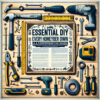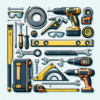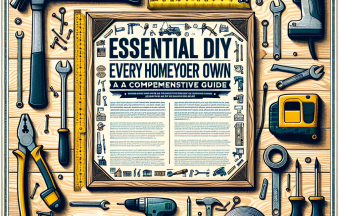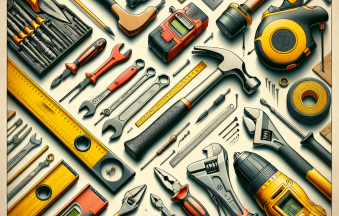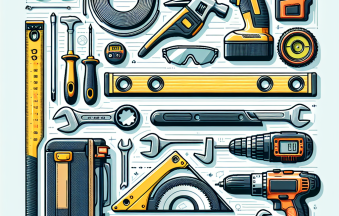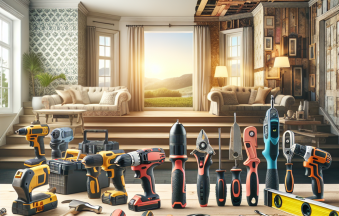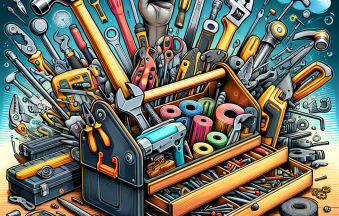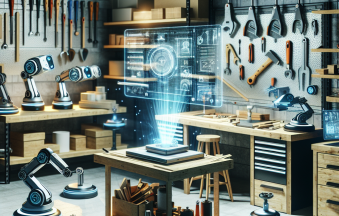Whether you’re an experienced DIY aficionado or just beginning to delve into home renovation tasks, possessing the appropriate tools at your fingertips is vital. In this guide, we will investigate different types of DIY tools, from household appliances to illumination options, that can assist you in addressing any task with assurance.
Household Tools
Household tools denote necessary instruments and devices that facilitate various domestic chores. Begin with a tool kit that encompasses a hammer, screwdrivers, and pliers. These essentials are priceless for assembling furniture, hanging artwork, or executing minor repairs. Investing in a power drill is another transformative decision; it enables you to undertake tasks like constructing shelves or even installing new light fixtures.
Multi-functional Tools
An excellent multi-functional tool can become your closest ally, integrating several capabilities into a single portable unit. Search for devices that incorporate features such as a knife, scissors, and screwdrivers. These are ideal for quick repairs around the household or when you’re in transit.
Construction Materials
Regarding any building-related activities, being familiar with the variety of construction materials accessible is crucial. These materials range from lumber and drywall to insulation and fencing supplies. Reflect on the project at hand—be it a shed, a fence, or room alterations—making sure you possess appropriately sized and quality materials can greatly influence the outcome.
Fixatives and Adhesives
In addition to your building supplies, maintaining a well-stocked assortment of fixatives such as nails, screws, and brackets is essential. Don’t overlook reliable adhesives like construction glue or wood glue; these can offer strong, enduring bonds for structural projects.
Electrical Instruments
Managing electrical tasks can be daunting, but with the right equipment and understanding, you can safely handle wiring projects. Initiate with safety gear such as insulated tools and rubber gloves. A dependable voltage tester can assist you in checking circuits safely prior to commencing any electrical work.
Cable Strippers
Cable strippers are an indispensable tool for any electrical endeavor. These instruments allow you to effortlessly remove insulation from wires for appropriate connections. Ensure you also have a high-quality screwdriver set since many electrical fixtures necessitate specific types of screws.
Hardware & Fasteners
From putting up shelves to repairing loose door handles, having the proper hardware and fasteners within reach can save you both time and aggravation. Common items consist of hinges, locks, and drawer pulls, coupled with a generous supply of screws and anchors for various uses.
Hardware Organization
Investing in a good organizer for your hardware can significantly facilitate your DIY workflow. Think about using a tackle box or a multi-drawer system to keep everything sorted and easily accessible.
Kitchen & Bathroom Instruments
Whether refreshing your kitchen with new cabinetry or revitalizing your bathroom with new fixtures, having the correct tools is crucial. Besides general tools, specialized items such as tile cutters, caulking guns, and plumbing wrenches can be extremely beneficial for renovations in these areas.
Plumbing Instruments
For plumbing-related assignments, a plumber’s wrench and a pipe cutter are necessities. These tools simplify replacing faucets or installing new sinks without needing to call in a professional.
Light Bulbs & LEDs
When illuminating your home, adaptability is essential. Transitioning to LED light bulbs can drastically reduce energy expenses and offer improved lighting. Examine various wattages and color temperatures to determine the best fit for the ambiance of each room.
Intelligent Lighting Options
Consider implementing smart bulbs or intelligent lighting systems that can be controlled via smartphone applications. This technology enables you to adjust lighting levels and colors, enhancing your home’s ambiance and energy efficiency.
Lighting & Fans
Proper illumination and air circulation are vital in forming a comfortable living environment. Ceiling fans can aid in air movement while adding aesthetic appeal. Ensure you have the appropriate tools to install any lighting fixtures or ceiling fans you select, including a ladder, mounting hardware, and wire connectors.
Energy-Efficient Options
Seek out Energy Star-rated ceiling fans and light fixtures. These products not only lower energy bills but also contribute to a more sustainable dwelling.
Measuring Instruments
Accurate measurements can determine the success or failure of a project. Fundamental measuring instruments include tape measures, levels, and squares. A laser level can also significantly improve precision for larger tasks like hanging cabinets or laying tile.
Layout Instruments
For larger projects, consider investing in layout tools such as chalk lines and marking gauges. These will assist in ensuring every cut and installation is executed flawlessly.
Paint & Wall Materials
Refresh your home’s appearance with quality paint and wall materials. Beyond just paintbrushes and rollers, think about tools like paint trays, drop cloths, and painter’s tape for crisp lines and a professional finish. Adequate preparation is key; ensure you have all necessary materials before you start painting.
Selecting Paint Thoughtfully
Choosing the appropriate paint finish—whether matte, eggshell, or semi-gloss—can affect both the appearance and durability of your work. Keep the room’s purpose in mind when making your selection; for instance, semi-gloss is often preferable for kitchens and bathrooms due to its moisture resistance.
Equipping yourself with these fundamental DIY tools can empower you to take on any home improvement project with confidence. Armed with the right apparatus and a bit of knowledge, you can transform your DIY aspirations into remarkable realities.





